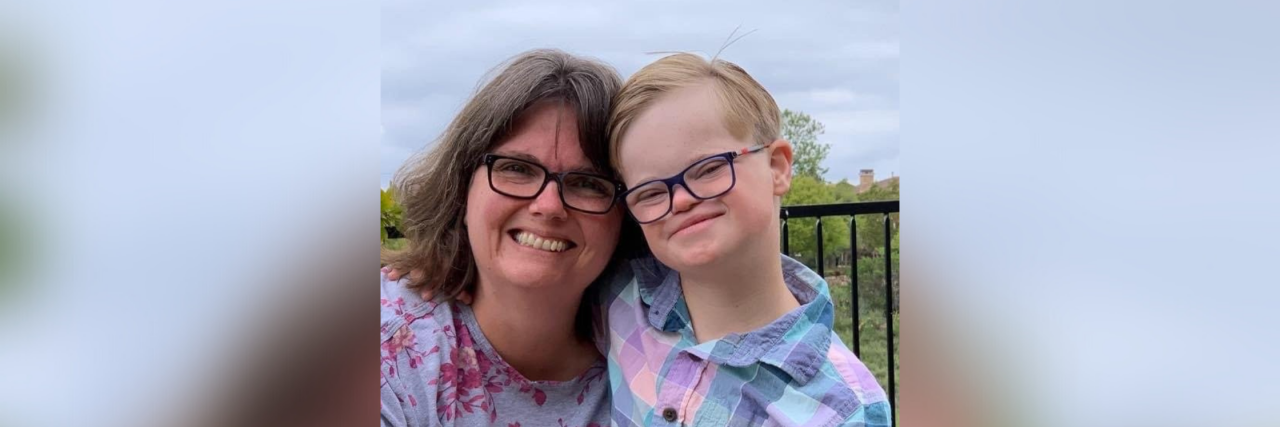I am sitting in the chair at the hair salon, braced for the small talk that inevitably comes. I have a new stylist so we cover the basic topics — where I live, what I did last weekend, do I have any kids?
“I have a son named Bobby,” I answer. “He’s 13.”
“Uh oh,” the stylist responds. “Has the teenage attitude started yet?”
“Not really. He’s a good kid.”
“Does he like sports? Is he into video games?”
I pause a bit awkwardly. In these pandemic times, Bobby spends hours every day outside swinging or jumping on his trampoline. When he comes inside, it’s to watch shows, like “Word World” or “Pocoyo,” that are typically watched by very young children. He’s not your typical 13-year-old. Describing him requires a little context.
“He has Down syndrome,” I tell her before describing Bobby’s day.
When I’m finished I pause again, considering whether I should caveat my description by explaining that not all people with Down syndrome are like my son. Some teenagers enjoy more age-consistent activities like sports and video games. Not all 13-year-olds with Down syndrome watch younger children’s shows. I can hear the protests of other parents in my head — I’m infantilizing people with Down syndrome instead of showing them to be like their peers. Never mind I’m just telling the truth.
Marketing an entire community is hard. An older mother of a boy with Down syndrome once told me that she encouraged others to believe that her son was “happy all the time.” “Of course it isn’t true,” she told me, “but it’s how doctors and teachers find value in him. Otherwise, they think he is just a burden.”
I sympathized with her predicament even as I blanched at her willingness to agree with such a harmful stereotype. It’s hard to parent a child that other people look down upon. It’s a constant struggle to teach others that our child has value when society has such biased ideas about what is valuable.
I’m not always sure how best to do it. If that older mother lived in the era of “happy all the time,” I now parent in the age of “more alike than different.” Our community tends to promote the value of people with Down syndrome according to their resumés and how much they accomplish relative to their typical peers. Such an approach leaves out my son.
Bobby has not kept up with his peers in school. He is largely non-verbal and communication overall is challenging for him. Reading and math-wise, he is still at a pre-k level. He’s not on track for the high school algebra class that is required for a diploma. He doesn’t share the interests of many of his peers — including those that have Down syndrome.
In this “more alike than different” world, I have a son whom I primarily admire for the way in which he is unique. His strongest intelligence lies in his ability to be mindful. While I have lived with depression throughout this long pandemic quarantine, Bobby has thrived by finding his center in the vestibular stimulation of the swing and trampoline. While many children with cognitive disabilities have struggled with remote learning, he has been able to seamlessly adjust to the new environment, taking each day and each challenge as it comes. In a world where so many worry about following the latest fashion, Bobby steadily and unselfconsciously stays true to what he likes and to who he is.
I am proud of my son, but I also sometimes feel conflict over our place in the Down syndrome community because Bobby does not fit the current ideal of being “more alike than different.” It would be easier if Bobby “followed the company line,” so to speak, and was on track to hit common milestones.
However, easier is not always better. While the “happy all of the time” trope was harmful to all people with Down syndrome because it placed an unreachable expectation upon them to not exhibit the full range of human emotions, the “more alike than different” ideal also does a disservice to the diversity of our community. A person’s value is not in their desire or ability to be like their peers, it is in their ability to share their strengths and blessings with the world, no matter what form those come in.
I hope the era after “more alike than different” better reflects people like my son. For he is as valuable as anyone else.

